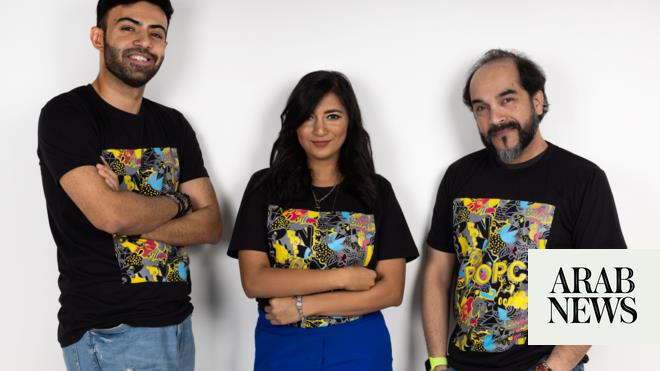
DUBAI: Tashkeel — the UAE-based art platform — hosted its annual open-call exhibition through March and April. This year’s theme was “The Philosophy of Food,” which Tashkeel called “of timely relevance to society and the world in which we live.”
Like much of the GCC, the UAE imports the vast majority of its food. Thus, the exhibition brochure stated: “A monumental shift is required in the way we approach food; how we source it, prepare and consume it… Today’s sustainable food movement is global. Unled yet inspirational, it requires us to be more reflective on food, our values and choices, living by principles based on the importance of science, the recognition of restriction and the need for wholesome sustenance.”
Tashkeel invited artists and designers in the UAE to submit works exploring issues around the philosophy of food. Here are some of the highlights.
‘Red Pill’
Abir Tabbarah
Born in Italy, Tabbarah now lives in Abu Dhabi. This work, according to the show brochure, “explores the future of food and the epitome of fast food — a pill with all the nutritional content of the recommended dietary allowance.” This is not so far-fetched an idea as it might have seemed 20 years ago. But while such pills might fulfil humanity’s physical needs and greatly reduce the environmental impact of food production, Tabbarah’s work also raises the questions of what such a diet would mean for our social lives and mental wellbeing.
‘Eating with a Ghost’
Aya Afaneh
Aya Afaneh, Eating with a Ghost (2022). Supplied
The Palestinian artist, writer and performer was a natural fit for this particular exhibition; she is already working on a collection of recipes, stories and poetry dedicated to her late grandmother. Her contribution to Tashkeel’s exhibition was this video performance — “a conversation between the artist and her grandmother, in spirit” — which asks the question: “What happens to food and tradition when the people that pass it down are gone?” In the video, Afaneh prepares and eats kousa, a stuffed zucchini dish — exhibiting the kind of inherited knowledge that is “crucial for extending the lifespan of cultures and unspoken traditions.”
‘Supper’
Debjani Bhardwaj & Mohammed Al-Attar
Debjani Bhardwaj & Mohammed Al-Attar, Supper (2022). Supplied
Bhardwaj works primarily with papercut and ceramic art, while Al-Attar is focused on digital art. The two teamed up for “The Philosophy of Food,” producing this humorous but thought-provoking work that “depicts a macabre role reversal as a statement of factory farming.” A group of commonly consumed animals feed on humans, reminding the viewer “to think about these creatures as sentient beings, many of whom endure horrible lives and deaths…”
‘Land and Children 1’
Hoda Gharib
Hoda Gharib, Land and Children 1. Supplied
This piece is from the Egyptian artist’s “Land and Children” series of Chinese ink drawings on cotton paper. It is inspired, according to the show catalogue, by her “poetic-visual vision of man’s close connection with the land…” It continued: “The contrast and diversity of the visual image, particularly in the shaded gradations between black and white, evoke the enduring spirit needed to face the current challenges and the spirit of hope for the future.”
‘The Beauty Within 3’
Mahima Aswani
Mahima Aswani, The Beauty Within 3. Supplied
Although Aswani is primarily an artist and designer, for this show she contributed a series of images of tomatoes which addressed the issue of “perfect versus imperfect food.” “In today’s consumer-led retail, imperfect food items constitute around 40 percent of food waste,” the catalogue explained. “Beauty can be found in nutritional value, and not in external appearance.” This final image — a mix of ‘perfect’ and ‘imperfect’ tomatoes — “encourages the viewer to celebrate the beauty within.”












